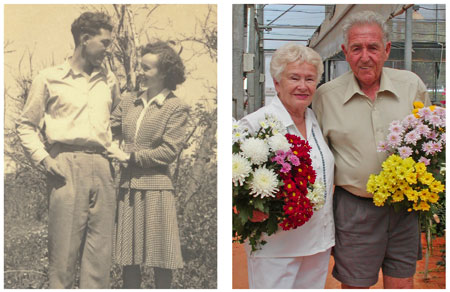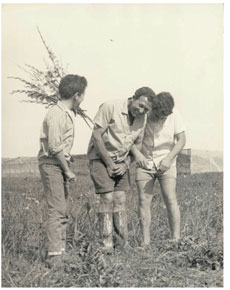7/1/2022
Danziger: Horticultural Pioneers
Chris Beytes

In our close-knit world of horticulture, Israel has long been known as a pioneer in advanced technologies, such as irrigation. Which makes sense, seeing how it’s a Middle Eastern desert country with limited resources.
But another reason for Israel’s success in agriculture comes from the immigrants who came to the country in the 1900s from Europe, Africa and other areas. Some were wealthy and some were poor. All were seeking a better life. They possessed their educations, skills and a desire to succeed. And educated they were! Many had advanced degrees, business experience or were experts in specialized trades.
Pictured: Ernest and Zehava Danziger—independent, yet idealistic, young farmers. • The Danzigers in modern times retained that spirit.
Some of these early settlers lived in communes called “kibbutzes”— socialist, egalitarian settlements where residents pool their resources and talents for the common good. One of the first things these new settlers needed was a dependable source of food. Food security was essential to a free and independent nation, and so to them, agriculture was more than a vocation, it was an ideology. So these smart, educated “kibbutzniks” devoted their talent and energy to agriculture.
Ernest Danziger, the son of a German flour factory owner, learned to farm on a kibbutz. Ernest came to Israel in 1935 at age 13 with his mother. He got a good education and learned English, but he, too, believed in the ideology of farming over other professions he might have pursued.
It was in the kibbutz that Ernest met the lovely Polish immigrant Zehava Baumwell, who was on an extended work stay there. Was it love at first sight? We suspect so … they married in 1948, the same year their new homeland achieved statehood.
The young couple shared a pioneering, independent spirit, and in 1953, Ernest and Zehava were able to start a small (about 2½-acre) farm in Mishmar HaShiv’a, a village near Tel Aviv. Their first crops were corn (the only crop Ernest knew how to grow) and strawberries (because they loved to eat them).
“At first, you could make a good living growing vegetables from just a small piece of land,” recalls their son Micha, who spent his boyhood with his brothers Gaby and Daniel working the fields (Daniel, an army pilot, was killed in a training exercise in 1970). “Tomatoes, peppers, lettuce—you name it, they grew it. They understood that being able to produce your food and to be connected to the land was important for the wellbeing of Israel.”
For a while, the Danzigers made a decent living from their small farm, but economics soon made it difficult. Fortunately, a change was in the air: The young state of Israel saw flower exports as a way to encourage the population to settle in agricultural areas, to create jobs for new immigrants and to bring foreign currency into the country.
Sensing the potential, Ernest redirected the family farm into this new market. They started with gladiolus, which they sold to the local market and exported to Europe. Cut chrysanthemums followed, using the new year-round flowering techniques developed in the U.S.
It was the 1960s and the Danzigers were not just horticultural pioneers, they were also social and economic pioneers. The young country of Israel had imported many heavily socialistic traits from some of its new residents, such as the kibbutz communes, but the idea of “from each according to his ability, to each according to his needs” was better in theory than in practice.
 Micha recalls that Danziger was one of the first companies to introduce what he calls “advanced socialism”—such as hiring and paying employees in a fair way that didn’t exploit them, and pioneering the idea of women in the workplace, especially those from countries where women traditionally didn’t work. The Danzigers created a culture on their farm that, over time, made it acceptable, and even desirable, for women to work there.
Micha recalls that Danziger was one of the first companies to introduce what he calls “advanced socialism”—such as hiring and paying employees in a fair way that didn’t exploit them, and pioneering the idea of women in the workplace, especially those from countries where women traditionally didn’t work. The Danzigers created a culture on their farm that, over time, made it acceptable, and even desirable, for women to work there.
Pictured: Ernest, with Gaby and Micha, in a gladiolus field in the 1960s.
Cut chrysanthemums introduced Danziger to their next venture—the young plant business. It was a Dutch business partner who convinced them to produce mum cuttings for this burgeoning market, which quickly grew to numerous cut flower, potted and bedding crops.
Says Micha of the time, “Even as Israel’s cut flower production industry was growing and evolving, we at Danziger understood that with the local growing conditions, the climate limitations, labor costs and the lack of water, we needed to think differently. This led us to be creative and maximize our capabilities in the Israeli market while accumulating knowledge and experience that would allow us to one day break into the big world, and be less and less dependent on the local market only.”
Young plants were more profitable that either corn or cut flowers, but they didn’t provide the independence the Danzigers valued. Experience as a licensee of Mikkelsen, Kientzler, Fides and other breeders introduced them to the challenges and restrictions of such a relationship. This was counter to the Danziger’s quest for independence, so in the 1980s they decided to begin their own breeding program.
Explains Micha, “We needed to advance our capabilities and not just be a producer. For the long-term, we need to be independent with our genetics.”
It was the late ’80s and early ’90s when Danziger introduced their first breeding efforts, which were in asters, New Guinea impatiens and cut gypsophila. They pushed hard into the European and North American markets, learning how the distribution systems worked and developing relationships. It was a breeding breakthrough in 1997 that aided their push into the global market: Million Stars Gypsophila. Million Stars was faster to flower, required less light and held up better in shipping.
Today, under the leadership of Micha (Chairman of the Board), his brother Gaby (CEO) and Micha’s son Ori (deputy CEO and head of marketing and sales), the Danziger Group offers more than 100 different annual, perennial and cut flower crops that compete with the best in the world. They’ve expanded their young plant production into Guatemala with a 50-acre farm that serves North America. They still produce cut flowers at their 200-acre Beauty Line farm in Kenya. And, most recently, Danziger has become partners in Equinom, a “food tech” company that uses advanced genomic breeding technologies to create new non-GMO “super food” crops such as peas and beans with more protein and higher nutrition that can be used in plant-based foods.
Today, agriculture is a much smaller part of Israel’s economy than it was in Ernest and Zehava’s time. However, it’s still critically important for the country’s security, and ag tech and food tech are considered the hot new fields in Israel. Danziger’s investments in these leading agricultural technologies are proof that the second and third generations remain true to the independent. GT